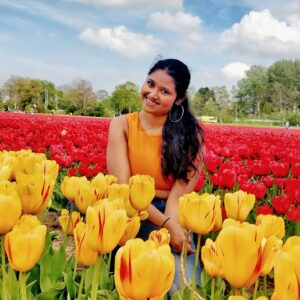Meet Eshita – one of your student reps based at the University of Leeds!
Eshita did her undergraduate degree in Biotechnology in India. While working on her dissertation project in angiogenetic development within zebrafish, she additionally worked on another project looking at neurobiology development within zebrafish. After she graduated she worked as a high school teacher before undertaking a Master’s degree focusing on clinical neuroscience at the University of Groningen in the Netherlands. She developed assays to investigate how quality control worked with the nucleus by using nanoparticles to block the nuclear pore complex which allowed her to investigate the efficiency of cellular mechanisms. Furthermore, she undertook a second project designing a technique to label neuronal cells in zebrafish with multiple fluorescent proteins which enabled her to investigate the developmental lineage of cells. Following this impressive Master’s project, she undertook a research staff position helping undergraduate students with their research projects for a year before she began her PhD at the University of Leeds.
Eshita’s is in her first year within the Lukacs lab and is investigating novel receptors within the somatosensory system. For this, she will attempt to design a method to separate sensory neurons based on the stimulus they respond to. Then she will analyse the neurons using single cell RNA sequencing and compare genetic profiles to identify novel genes that can be tested.
What do you do when you’re not doing science?
Probably take a train to Amsterdam to see my boyfriend. It’s difficult to manage a relationship between 2 countries. But, other than that, I really like travelling as well. My aim for this year is to be able to explore at least 3 new countries. I have a collection of postcards that needs replenishing. I am also a dancer and I’ve been trying to find a space somewhere in the university where I can dance more regularly than my cramped apartment. I also love reading. I have been trying to get back into the habit of reading at least one book a month.
What has been the most challenging aspect of your science career so far?
Risk taking, I presume. Both my master’s projects were pilot studies that involved a large degree of independence. I had multiple failed experiments, sometimes with techniques I was highly familiar with. It was difficult to keep continuing a project that might not work out and fail the objective we were trying to achieve. Persevering with a risky undertaking has been challenging. And continuing in the face of negative results has been very educational.
Who has most influenced your career so far?
I think my mum is the one person I look up to the most. She’s been juggling a lot of roles for a long time now. But on an academic level, I think my mentor Dr. Liesbeth Veenhoff inspires me a lot. I was a master student in her lab and I definitely want to emulate her work ethic and the curious nature she brings to her lab in my own scientific method.
Why did you want to become a rep?
I have previously worked as a student body representative during my masters and enjoyed that experience immensely. This opportunity gives me a chance to see the administrative side of academia and network with peers.
What has been your biggest lab mistake so far?
A recent mistake I made was not checking the plasmid map carefully and designing primers for a plasmid sequence that could have easily been cut out using a restriction digest.
Coolest part of your PhD so far?
I get to design viruses and work with them to infect neurons. I think that is cool.

